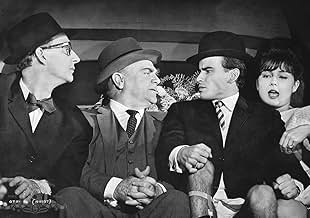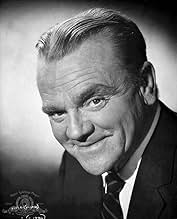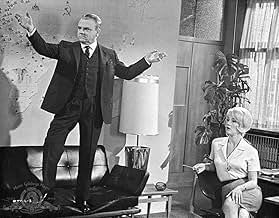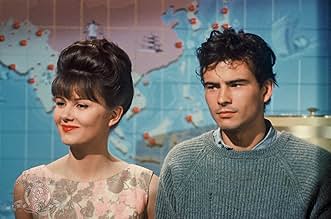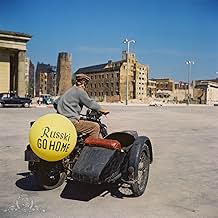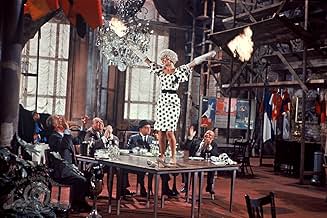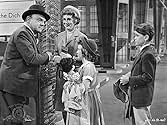Em Berlim Ocidental durante a Guerra Fria, um executivo da Coca-Cola tem a tarefa de cuidar da filha de seu chefe da alta sociedade.Em Berlim Ocidental durante a Guerra Fria, um executivo da Coca-Cola tem a tarefa de cuidar da filha de seu chefe da alta sociedade.Em Berlim Ocidental durante a Guerra Fria, um executivo da Coca-Cola tem a tarefa de cuidar da filha de seu chefe da alta sociedade.
- Direção
- Roteiristas
- Artistas
- Indicado a 1 Oscar
- 1 vitória e 8 indicações no total
- Fräulein Ingeborg
- (as Lilo Pulver)
- Melanie Hazeltine
- (as Lois Bolton)
- Krause
- (narração)
- …
- Cindy MacNamara
- (não creditado)
- Direção
- Roteiristas
- Elenco e equipe completos
- Produção, bilheteria e muito mais no IMDbPro
Avaliações em destaque
For what was and what should have remained his swan song to the world of film James Cagney heads the cast in this. He's the man in charge of Coca-Cola's operations in Germany which is headquartered in West Berlin and he's had a lovely little present dumped in his lap. The daughter of the CEO of Coca-Cola is in Europe and now she's in Germany and he's expected to watch out for her. The daughter is played by Pamela Tiffin and she is one of the biggest airheads ever portrayed on the screen. She's fallen big time for a German kid played by Horst Bucholtz. They've gotten married.
Bucholtz is a kid who's real good at spouting all kinds of left wing slogans without delving to deeply into their meanings. He's a Communist and that drives Cagney nuts and if it drives Cagney nuts, Tiffin's father is sure to go over the top. Cagney takes it upon himself to get Bucholtz arrested on the East Berlin side as an American spy.
Of course a small memento of their married life has developed inside Tiffin so now Cagney has a real problem. He's got to get Bucholtz back and turn him into a money grubbing capitalist in his image. The frantic pace at which this is attempted, racing against the clock when Tiffin's father played by Howard St. John arrives in Berlin is what the rest of the film is about.
Wilder has a ball reducing the Cold War to its basic absurdities. The USA is symbolized by James Cagney who thinks the whole world will become America if only enough Coca-Cola is peddled. Cagney comes real close to proving it so.
The Communists come out far worse. Karl Marx's world always looked nice on paper, but always has had a real problem being converted into a functioning state. The Russians are also good at spouting the party line, but in One, Two, Three, Wilder shows how very easily they can be influenced by some of life's most elemental things and I don't mean Coca-Cola.
Cagney did not always get along with Wilder, but both men were professional enough to bury certain creative differences. Cagney was kind and patient with Tiffin who was getting her first real break in film. However he grew to positively loath Horst Bucholtz. In his memoirs which came out in the 1970s, Bucholtz was the only colleague who Cagney had anything really critical to say about.
During the middle of the film being shot, the Russians stopped the flow of traffic from West and East Berlin. Some shots had to be redone around the Brandenburg Gate, a whole set had to be constructed. I suppose a well trained cinema professional could spot the shots where the real and the fake Brandeburg were used. I sure can't. The following year, the Berlin Wall was built, so Wilder got his film done just in time.
Arlene Francis plays Cagney's exasperated wife and she of What's My Line does just fine. Cagney made an appearance on that show just before shooting started and gave the picture a big old plug.
The laughs come pretty fast and furious as James Cagney struggles mightily to prevent the arrival of "another bouncing, baby, Bolshevik."
But for a dessert, it's still 'rich' enough to be enjoyed with its machine-gun dialogues worthy of Hawks and Cukor' classics that makes you wonder if you didn't accidentally fast-forward the film at 1.5 speed. And there is such vaudevillian streak of incongruous events and improbable coincidence that it provides the right canvas for safe hilarity, in other words so many things happen in the film that even the lousiest gag doesn't have time to fall flat, another comes at the rescue. And as Coca-Cola executive McNamara, James Cagney delivers a painstakingly energetic performance that exhausted him so much he retired from acting for 20 years until his cameo in "Ragtime", that's how demanding his role was... and you can feel it in the screen.
Cagney didn't get along with Horst Bucholz who plays Otto the young idealist communist who marries the Coca Cola's top man's daughter (Pamela Tiffin) and wished he could kick his ass to calm down his scene-stealing impulses. These incidences reminded me of Fonda not getting along with Ford during the shooting of "Mister Roberts", starring Cagney as well, but that didn't affect the film since it's all meant to be a big joke and in the scenery-chewing contest, Cagney and Bucholz are equally hammy and funny if you look at the film with indulgent eyes. Maybe Cagney was too old and Jack Lemmon would have been a more fitting choice as a middle-aged executive in one of the most emblematic American brands. We'll never know.
The real problem in "One, Two, Three" is that it starts brilliantly, the whole first act where we see "Mac" handling Germans' manners and double-edged efficiency draws a pattern of cultural clashes' gags that found an echo in both the Cold War context and the difference of mentalities between America and the European world, as if there was a second curtain behind the infamous iron one (though much lighter). But even if if the non-existence of the Berlin wall (only mentioned at the beginning) dates the film, made ironically the exact year of its building, the film also managed to be ahead of its time prophesizing the missiles crisis with a Russian executive saying about Cuban, "they give us cigars, we give them missiles".
The dialogues with the Soviet representatives are nothing short of brilliant writing, reminding us of the wit that Wilder displayed when he wrote "Ninothcka", a film whose comedic efficiency also depend on a funny Soviet trio. The comment about the Swiss cheese being rejected because it had holes had me in tears, to name that one. The plot thickens to the point of convolution when it adds the romantic subplot but it makes up for the blandness of the two lovers (no matter how colorful they're made to be) when it adds another dimension of cultural shift between Southerners and Yankees, the flimsy Southern belle didn't realize the political meaning of "Yankee, go home" slogan nor what a house "with a short walk to the bathroom" implied.
But the best asset the film has to offer is its slice of life from both sides of the Iron curtain or the soon-to-be Berlin wall. For all the antagonism directed against US capitalism, there might be one thing no one can resist which is a bottle of Coca-Cola, the brand that perhaps sold the American dream more than any political operation. So watching Cagney playing diplomacy with the Russian provided the film's best moments culminating with that unforgettable Sabre Dance and barefeet Fraulein Ingebörg frenetically shaking her voluptuous body on a restaurant table in front of executives getting an exciting taste of the Western dream. That musical sequence might be one of my favorite from any Wilder films and it's crucially set at mid-point just when the plot started to drag.
As I said, Horst Bucholz was hammy only to the degree that it was the only possible way to go the distance with Cagney and I enjoyed watching the lovable Arlene Francis playing his resigned but not discouraged wife. Yet the film is so busy providing one liners right after another that it takes the safe side and injects lousy wedding-and-divorce segments where so much could have been done in the area of politics. But maybe Wilder was getting too old-fashioned leaving sharper tones to a certain Cold-War comedy directed by Stanley Kubrick, interestingly a movie that also pays a tribute to Coca Cola through one of its most memorable scenes. That level of wit is missing in the film already dated by its own context. One thing to its defense though, it offers the perfect response to Joan Crawford's complain of product placement and the perfect punchline with Pepsi Cola having the last word.
And to give a last word, if the film isn't in the same league that "Some Like it Hot" and "The Apartment" and marks the decline of Wilder's prestige and awards pretensions, it still works and maybe it does so because somewhere I could feel it didn't pretend to be anything but a farce and comedy of manners with the Cold War as the backdrop. A "Dr. Strangelove" it isn't but either you don't find it funny or you do. I did find it funny many times and brilliant in a few scenes.
The talk is fast-paced. The humor is broad and full of Wilder wordplay. Cagney is an unrelenting engine. He is buzzing with energy and I half-expected him to explode in song and dance. The machine gun dialog is non-stop and can get tiring at some point. This is a feat of performance from the great Cagney.
Wilder plays no favorites -- and he takes no prisoners -- here. Everything within his considerable reach (the Cold War, the postwar era, spy-exchanges, Communism, capitalism, European aristocrats, idealism and cynicism, JUST for starters) is lampooned equally. (Even at least one of Cagney's early performances, in "Public Enemy," takes a shot.)
Frankly, I'm surprised this film today has so many staunch fans who weren't around back when so much of its humor was "topical." Its ongoing appeal has to be attributed both to Wilder's pacing and to James Cagney's hallmark performance as McNamara (a poster child for high blood-pressure if ever there was one). Neither he nor Wilder ever let up, ably aided by a solid cast (Horst Bucholtz in particular, strangely enough!) who manage somehow always to catch up.
"One, Two, Three:" that's how fast the gags fly. See if you can keep up.
Você sabia?
- CuriosidadesThe film recorded a loss of $1.6 million. It didn't do well at either the U.S. or German box office because the story felt much more sinister in 1961 when the Berlin Wall was erected.
- Erros de gravaçãoSchlemmer calls his former superior officer in the SS "Herr Oberleutnant". The SS had no rank of Oberleutnant nor did its members call each other Herr. Oberleutnant was a German Army rank. The corresponding SS rank was Obersturmführer. In the German (dubbed) version, Schlemmer correctly addresses him as "Obersturmführer".
- Citações
Borodenko: When will papers be ready?
C.R. Macnamara: I'll put my secretary right to work on it.
Mishkin: Your secretary? She's that blonde lady?
C.R. Macnamara: That's the one.
Peripetchikoff: [after conferring with the others] You will send papers to East Berlin with blonde lady in triplicate.
C.R. Macnamara: You want the papers in triplicate, or the blonde in triplicate?
Peripetchikoff: See what you can do.
- ConexõesEdited into Grand format: Amérique, notre histoire (2006)
Principais escolhas
Detalhes
- Data de lançamento
- País de origem
- Idiomas
- Também conhecido como
- One, Two, Three
- Locações de filme
- Empresas de produção
- Consulte mais créditos da empresa na IMDbPro
Bilheteria
- Orçamento
- US$ 3.000.000 (estimativa)
- Faturamento bruto mundial
- US$ 146
- Tempo de duração1 hora 44 minutos
- Cor
- Proporção
- 2.35 : 1
Contribua para esta página



